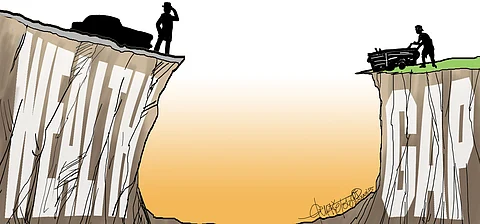
- NEWS
- the EDIT
- COMMENTARY
- BUSINESS
- LIFE
- SHOW
- ACTION
- GLOBAL GOALS
- SNAPS
- DYARYO TIRADA
- MORE

Recent data have revealed a worsening social imbalance, which should be a concern for the government, as it is a typical precursor to unrest.
A report by a US-based research firm indicated that the number of Filipino millionaires, measured in US dollars, had grown by 32 percent in the past decade, outpacing regional peers and major economies. This means that the Philippines presents lucrative opportunities for generating wealth.
The estimate is that there are approximately 12,800 high-net worth individuals in the country with a net worth of at least $1 million. These include 70 centi-millionaires or individuals with liquid investable wealth of at least $100 million, and 12 billionaires.
Compare this with official figures that indicate that 15.5 percent of Filipinos, or approximately 18 million people, live below the national poverty threshold of P13,873 per month for a family of five, and we have an overview of how the wealth disparity has been widening.
Rural areas, where 70 percent of the poor reside, have limited access to employment opportunities and essential services, thereby widening the wealth gap.
A recent Social Weather Stations (SWS) survey showed half of the respondents rated themselves as poor, higher than the official figures, indicating that the official metrics may have understated the poverty level which, as it is, is already the highest in the region.
Government inefficiency appears to contribute to the wealth disparity, as corruption, bureaucratic delays, inconsistent policy implementation, and weak institutions hinder the majority of Filipinos from benefiting from the economic transformation.
Worse still, the practice of providing handouts to the poor yields short-term gains in exchange for lifetime political patronage, which is becoming the norm in government.
The Philippines ranked 115th out of 180 countries in the 2024 Corruption Perceptions Index, with a disappointing score of 33, indicating persistent governance challenges.
Public funds for infrastructure, healthcare and education are often misallocated or siphoned off, benefiting the wealthy who control the political and economic networks.
The recent debate on the pork barrel in the 2025 national budget suggested that a substantial portion of the general appropriation was being funneled to members of Congress as bribes.
Countries like Malaysia and Vietnam, with stronger anti-corruption measures, have used public spending more effectively toward inclusive growth. Both nations have made significant progress in their battle against poverty, with almost no citizens living in extreme poverty.
The Pantawid Pamilyang Pilipino Program (4Ps), a conditional cash transfer scheme, covers 4.4-million households but faces issues such as delayed disbursements and inadequate monitoring, which reduce its effectiveness.
Additionally, funding for the main anti-poverty program was reduced recently in favor of patronage programs such as the Ayuda sa Kapos ang Kita Program, Assistance to Individuals in Crisis Situation, and the Tulong Panghanapbuhay sa Ating Disadvantaged/Displaced Workers.
The incorrect prioritization of populist programs, such as Congress’ efforts to legislate wage increases, contributes to the wealth gap.
Data showed that only two percent of salaried workers benefit from minimum wage policies due to the high level of informal employment.
In contrast, Indonesia’s cash transfer programs and Malaysia’s BR1M subsidies are more streamlined, covering larger populations and reducing inequality more effectively.
Despite substantial reforms, the local tax system remains ineffective in redistributing wealth. The Tax Reform for Acceleration and Inclusion Act of 2017 expanded revenue, but it relies heavily on indirect consumption taxes, which disproportionately burden the poor.
Progressive taxes, such as wealth or property taxes, are underutilized due to weak enforcement and loopholes that benefit the rich.
The Bureau of Internal Revenue struggles with tax evasion by high-income earners, further entrenching wealth inequality.
Such is the reality of the society in which Filipinos exist. The armies of the poor are considered fodder, who can be exploited by the rich to accumulate more wealth either through politics or commerce.
